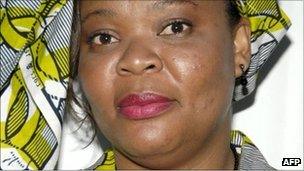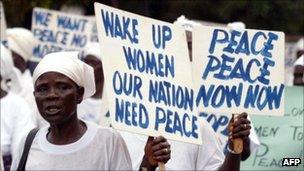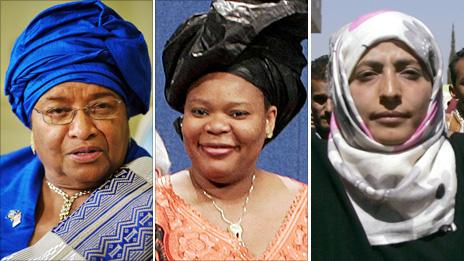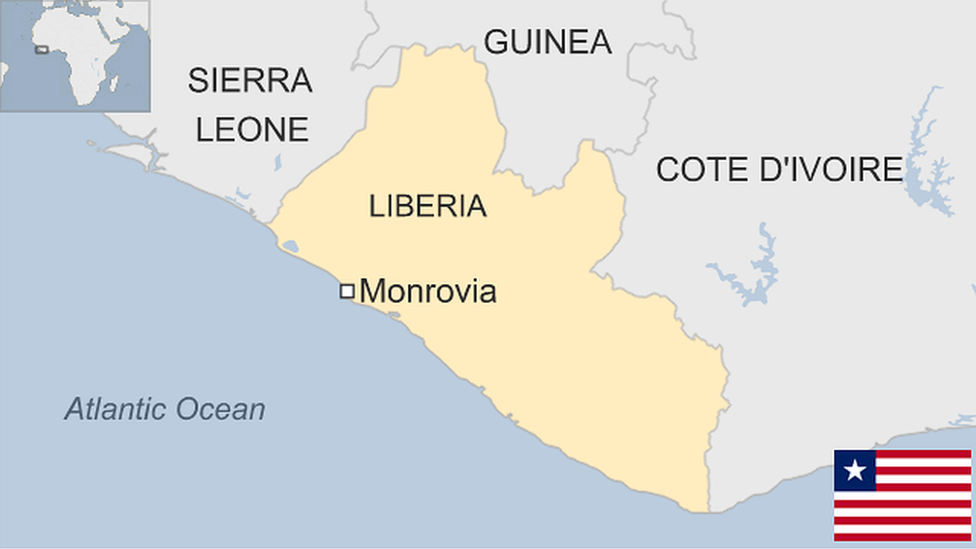Profile: Leymah Gbowee - Liberia's 'peace warrior'
- Published

Leymah Gbowee led a peaceful campaign to oust ex-President Charles Taylor
Nobel Peace laureate Leymah Gbowee, 39, mobilised women from across Liberia's ethnic and religious divides to call for an end to Liberia's brutal 14-year civil war.
Amid the shells and bullets, they prayed and protested for days on end, demanding that the conflict between former President Charles Taylor and rebel forces stop.
"In 2003, it was very difficult. We had lived with 14 years of conflict. A group of us, women, decided to take action for peace - including picketing, fasting and praying," Ms Gbowee told the BBC's Focus on Africa programme.
"This [award] is a huge recognition of the struggle of our women."
Ms Gbowee even suggested the women might go on a sex strike in a bid to bring the warring men to their senses.
Leymah Gbowee: "I am confused. I am humbled. This is the first time in the 39 years of my life that I am out of words"
Born in a village in central Liberia in 1972, Ms Gbowee, currently the head of the Ghana-based Women Peace and Security Network (WPSN), was soon exposed to two civil wars that affected her country from 1989 until 2003, when peace was achieved.
Deeply affected by the violence, she trained as a trauma counsellor, working among girls and women raped by militiamen.
"She has done counselling not only in Liberia but also other African countries such as the Democratic Republic of Congo," Bertha Amanor, Ms Gbowee's personal assistant at WPSN, told the BBC.
Ms Gbowee also thrust herself into political activism, rallying women to campaign for an end to the violence in Liberia.
Her crowning achievement came in 2003 when she brought thousands of women together to protests in the capital, Monrovia, helping to push Mr Taylor - who is now on trial at The Hague on war crimes charges - out of power and end the conflict.
Book tour
When Mr Taylor flew to Ghana's capital, Accra, for peace talks, the women followed him to continue their protests.

Leymah Gbowee organised mass peace protests by Liberian women
"They pursued him and they did not leave him until their efforts succeeded," says Ms Amanor.
It was Ms Gbowee's role in the campaign to oust Mr Taylor - more than anything else - that led to her receiving the Nobel Peace prize.
In its citation, the Nobel Committee said it had chosen her because she "mobilised and organised women across ethnic and religious dividing lines to bring an end to the long war in Liberia, and to ensure women's participation in elections. She has since worked to enhance the influence of women in West Africa during and after war".
Ms Gbowee said she was at a loss for words when she heard she had won the award.
"I am confused. I am humbled. This is the first time in 39 years that I am out of words," she said.
Ms Gbowee also suggested that Liberian women might go on a sex strike to increase pressure on the various (male) faction leaders.
"Their message to the men was that they can't go and kill mothers and daughters and then come home [to expect sex]," said Ms Amanor.
But the threat was never carried out.
Since the conflict ended, Ms Gbowee has written a book, Mighty Be Our Powers: How Sisterhood, Prayer, and Sex Changed a Nation at War.
It chronicles the violence in Liberia and the role women played to end the conflict. She has just ended a tour of the US to promote the book.
She is also a central character in the award-winning documentary, Pray the Devil Back to Hell, urging women around Africa to campaign for peace.
"She is a warrior for peace, a daring person who never gives up," said Ms Amanor.
"Right now, she is also helping to organise a peace summit in Ivory Coast [where a long-running conflict ended in April]. She wants reconciliation among Ivorians, not a witch-hunt."
Ms Gbowee was awarded the prize along with Liberia's President Ellen Johnson Sirleaf - about two weeks after the first African woman to win the prize, Wangari Maathai, died of cancer.
"This is a great tribute to her [Maathai]," Ms Gbowee said.
"This is a victory for women's rights everywhere in the world."
- Published7 October 2011

- Published13 February 2024
